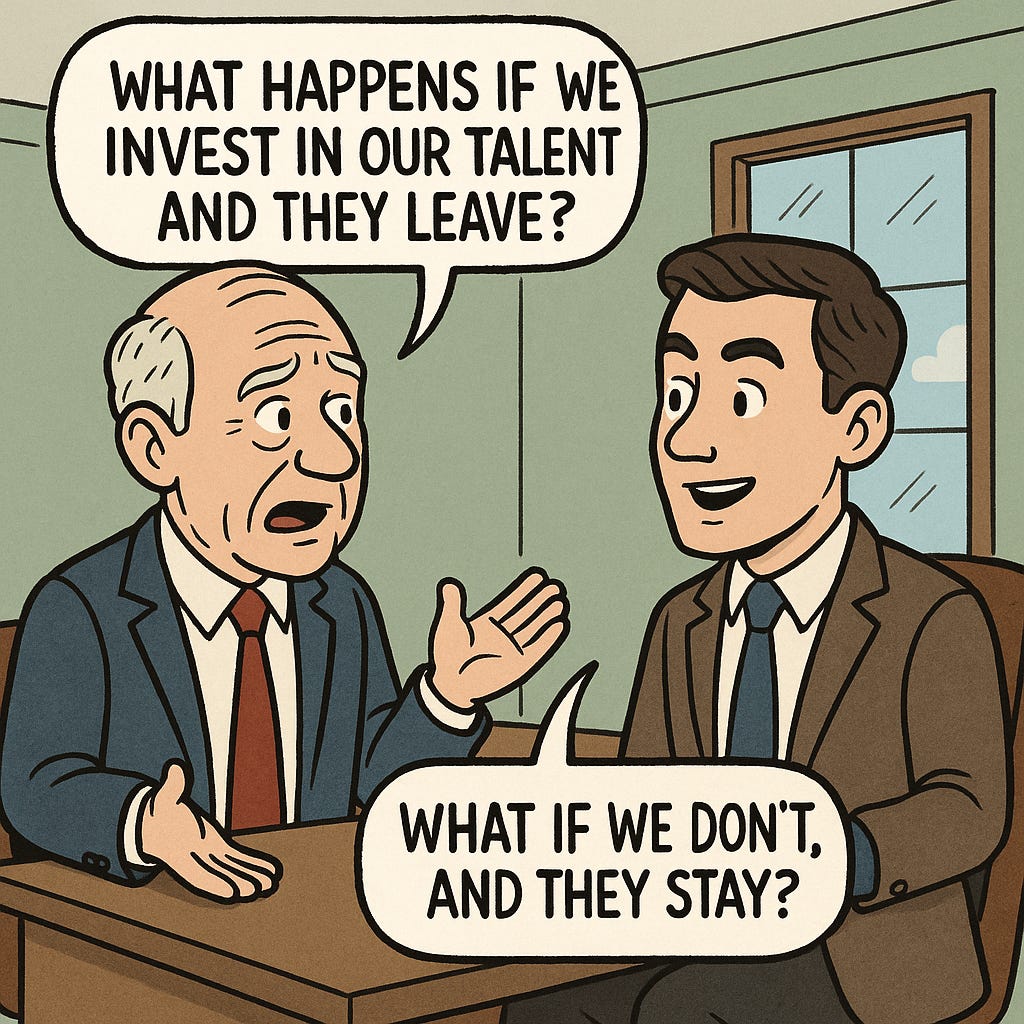The Kids Are Not All Right
Is Gen Z the most jaded generation in history to enter the workforce?
As a millennial, it can feel like the deck has been stacked against us at times. We watched our parents buy houses on the cheap as they worked at the same company their entire careers, dutifully being promoted as the global economy grew at the tail end of a pax americana that benefitted them immensely. Then we watched the dot-com bust right into 9/11 and the War on Terror become the backdrop of our entries into adulthood, followed closely by the global financial crisis. Add on real wage stagnation and economic policy myopically focused on the ultra-wealthy, and the resentment is easy to find.
But what can be lost in this “woe is me” scenario that many of us can feel at times is the generation behind us - those “digital natives” we like to call Gen Z. On top of all of the things millenials have had to deal with, they never had the Clinton 90s to know what life could have been like. Their secondary and post-secondary educational careers were devastated by Covid, and their early professional careers have been marked by senile presidents mirroring Weimar Germany and neo-fascism. How can one not be jaded by this, and - more crucially - how would that not translate into their work?
Slamming the Laptop Shut
In client services, there is an expectation that evening, late-night, and weekend work is required at times. Granted, this expectation has grown in an industry that has seen a race to the bottom on commercials to secure big client wins, but it is not a new phenomenon, even if the volume of it has grown of late.
So the popular “Slams laptop shut until Monday meme” seemed like a reasonable enough social media response to a culture veering towards overwork. But it seems like it is simply the beginning of a larger movement by younger generations when it comes to a 9-5.
The Friday afternoon laptop slam is beginning to creep into the week - new trends are coming of highlighting people’s 5-9s when they leave the office. I’ll be honest - and I swear I am not trying to be the old man that yells at a cloud here - but leaving the office at 5pm was never really a thing for many client-services millennials.
I entered the workforce in 2008, so any morning could have been punctuated with an empty box on your desk and 15 minutes to pack it up. Additionally, my first two office jobs paid OT, so leaving the office at 5pm was basically taking money out of your own pocket. Once I was properly on salary in the agency world, 5pm was rarely a leaving time - there’s always work to be done, and the NYC work culture is as brutal as it is demanding. So watching these videos feels like a look into a quaint time when people had better work/life boundaries.
But then you take a step back and you realize - these are real people - today! - leaving their job at five and taking random strangers on the internet through their eyewateringly boring lives. And it’s trending for a reason.
Extrinsic Motivation
Managing millennials isn’t that difficult of a task. It’s not easy, by any means, but we tend to be a very extrinsically motivated bunch. If you gave me an extra $10K as a junior employee at the agency, all you’d have to do as a follow-up was to point out the wall you wanted me to run through and I would have done it. Unadulterated capitalism may not be the best social system humanity has invented, but it’s the one the US subscribes to and my - like many millenials’ - upbringing and schooling ingrained in us that you worked hard and were successful and that’s kind of just how it was.
We’ve talked about intrinsic motivation before, but it’s a ratio, and from this newsletter’s experience and perspective, the new junior employees - who we can generously lump into Gen Z - are much more weighted in the intrinsic motivation department vs. its extrinsic counterpart. Throwing money at the problem is less than half the battle now.
They Might Have a Point
Zooming out, it’s clear that Gen Z is not donning any rose-colored glasses when it comes to their future in America. Much ink has been spilled on the topic, but a recent Times Opinion piece by Jessica Grose laid bare some of the issues Gen Z is facing.
The takeaway for this elder millenial is that the rules have changed even moreso than for our generation, and the old equation of college degree + good job + homeownership = the American dream (financial security, 2.5 kids and the white picket fence) simply doesn’t apply anymore.
Grose made it clear that this cohort doesn’t believe the American dream is dead (at least not collectively); just more enigmatic. She cites fellow Substacker Kyla Scanlon and her deep research into the generation.
Most Gen Z-ers I speak with aren’t trying to burn down the dream. They’re just trying to figure out if there’s still a door they can walk through. They still want security, love, purpose, but they’re more skeptical of the institutions that are supposed to provide them.
In a world where housing prices have skyrocketed for new buyers, the climate is changing at the level scientists have been screaming about for decades and we are feeling it, the American middle class has been hollowed out and wealth inequality continues to grow, and the downright abysmal political sphere in America, can we really blame Gen Z for not dropping everything for work every now and then?
Some thought leaders (with whom this newsletter has disagreed in the past) have even declared a War on Gen Z, pointing to an “intergenerational theft” as Gen Zers face down the sobering prospect that they are currently less well off than their parents and very likely will remain that way. The most stark statistic Galloway cites should worry everyone who wants to see America thrive as a country: an overwhelming majority of Americans over 55 like it; among those under 34? Under 20%. Regardless of previous one-sided beef, Galloway’s Ted Talk is worth a watch.
So How Do We Manage This?
And herein lies the problem: akin to previous generations, there is no playbook for the current management class to help steer and grow the careers of the generation after them. We can say it’s always been like this (and it has), but I think we can also recognize that the macroeconomic factors driving this uncertainty are at levels previously unseen.
That puts us in the “Complex” portion of the Cynefin framework - it’s not chaotic, but the relationship governing cause and effect is only clear after the fact. So there needs to be a little test and learn into what works. This is something we should be doing with our junior employees anyway - one management style or rubric does not fit all - but it needs to be on a grander scale thanks to the larger, systemic problems all seemingly coming to a head simultaneously.
So the approach should be one of emotional intelligence - previously called empathy, psychological safety, EQ, etc. Being able to recognize unmet needs at work amongst junior employees will help identify fixes and strategies to lessen the pain of them.
Is this approach foreign and new for millennials and Gen Xers? Absolutely, but business requires constant innovation and strategic revision to remain relevant and at the top of one’s game - managing juniors is no different.
There’s an old adage I constantly refer to when I sniff even a hint of resistance to meeting younger talent halfway: would you rather invest in talent that potentially leaves the organization, or shortchange them on development and have them stay?

Grab Bag Sections
WTF Heat Wave: Last year almost to the day we had a similar heat wave the the one we’re experiencing now in greater New York. I have plenty of complaints but lack the energy to verbalize them. So instead, enjoy (again) one of my favorite jokes from Arrested Development.
Album of the Week: I said on LinkedIn pushing out my last post that all albums of the week would be Clipse albums until July 11, when Let God Sort ‘Em Out drops. This newsletter has already pre-ordered the box set from Complex (though if we’re being honest, I’m not 100% sure what I’m going to do with the CD.) We tackled the long-awaited sophomore album last post - let’s take a look at their lauded debut album Lord Willin’.
There are a handful of albums that immediately put me in a fugue state and return me to high school in metropolitan Boston; Lord Willin’ is one of those albums. Released near the end of the CD era, the album just missed being number 1 on the Billboard 200, moving a respectable 122K units in its first week. While 2002 was a big year for rap (Eminem, Jay-Z, Nas, Ja Rule, and Nelly all dropped albums), Clipse still stood out for their incredible debut.
In fact it’s such a good first studio album, Rolling Stone ranks it #12 on their top 100 debut albums of all time, third only in the rap category to Wu-Tang’s 36 Chambers and Biggie’s Ready to Die (which, fair.) The lead single “Grindin” is peak Neptunes gritty production, and its lore is only deepened by the fact that Jay-Z (who, with all due respect, would not have made a track as legendary as “Grindin” with it) almost got the beat thanks to a dustup between the brothers and childhood friend Pharrell.
I could write a dissertation on this album, so suffice it to say: listen to it, then listen to it again. Having been released in August by a Virginia Beach duo means you usually have to wait until later in the summer to get the full ambience with the bass having to hum through the heat and humidity, but thanks to climate change you can now do that a week before July in New York. Enjoy.
Quote of the Week: “War is peace. Freedom is slavery. Ignorance is strength.” - 1984
See you in two weeks!





